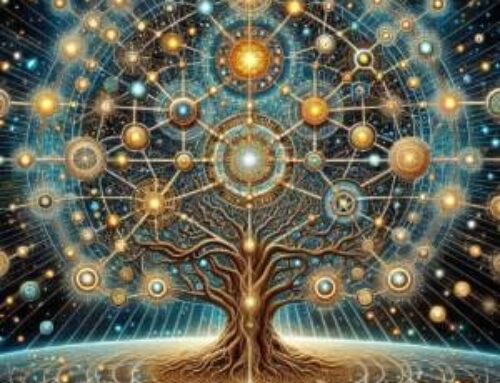Contents
Introduction to Contemporary Gnosticism
In the labyrinth of modern spirituality, contemporary Gnosticism emerges as a beacon for those seeking deeper understanding beyond the veil of material existence. Rooted in ancient traditions yet dynamically evolving, Gnosticism today intertwines with cutting-edge technology and age-old Hermetic principles, crafting a unique path for the modern seeker.
Contemporary Gnosticism does not merely echo the esoteric whispers of the past; it adapts these mystical doctrines to the rhythm of the current era. It calls for a profound personal transformation, urging individuals to explore their inner worlds amidst the chaos of the external. From the ancient teachings of Kabbalah and the Hermetic wisdom to the innovative influence of artificial intelligence on spiritual practices, this multifaceted approach provides a holistic framework for understanding the divine within and around us (1).
This article delves into the very essence of contemporary Gnosticism, unraveling its foundational beliefs, examining the intersection of spirituality and technology, and elucidating the timeless Hermetic principles that continue to guide the seekers of truth in their quest for enlightenment.
Exploring Gnostic Philosophy, in Todays World
Tracing the Past and Bridging to the Present
Modern interpretations of Gnosticism are deeply rooted in wisdom particularly drawing inspiration from the mystical doctrines of early Gnostic groups and Hermetic traditions. These foundational principles form a reservoir of knowledge that continues to shape spiritual customs. The intricate portrayal of the divine as envisioned by Gnostics mirrors todays pursuit of unraveling the concealed truths of existence. The ancient belief in a wisdom that could bring about liberation resonates strongly with contemporary truth seekers.
The Search for Spiritual Insight
Fundamentally present day Gnosticism underscores the journey towards gnosis – an understanding of realities. This quest delves beyond exploration urging individuals to surpass worldly confines and discover the divine essence within themselves. Modern adherents often practice meditation, analyze dreams and delve into literature to attain this heightened level of consciousness. The focus lies on encounters and firsthand comprehension of the divine than conforming to external authorities or doctrines.
Applying Age Old Knowledge, in Todays Society
In our era shaped by progress and scientific revelations followers of Gnosticism adapt ancient teachings to fit contemporary circumstances while finding relevance amidst societal shifts.
The teachings of Gnosticism provide a balance, to the focus on materialism guiding people towards a enriching life. In our changing world the interpretation and application of these timeless beliefs continue to adapt ensuring their relevance in todays society. In a time where technology often takes stage over matters Gnostic principles serve as a reminder of the significance of inner development and the search for deeper truths.
The concept of Gnosis, or spiritual knowledge, is the path to divine understanding and liberation. “This is, O Tat, the Gnosis of the Mind, Vision of things Divine; God-knowledge is it, for the Cup is God’s”(2).
Contemporary Gnosticism goes beyond study or theoretical understanding; it encompasses a practical experience of spirituality in everyday life. Present day Gnostics may engage in practices participate in rituals and strive to expand their consciousness through direct encounters, with the divine. This active and personal approach keeps Gnosticism alive and pertinent providing a pathway to enlightenment that’s both ancient and innovative.
Exploring Spirituality and Self Discovery in the Modern Digital Era
Digital Gnosticism; An Overview
In todays era of advancements modern Gnosticism embraces the use of new digital tools and technologies to aid in spiritual development and self exploration. By blending practices, with state of the art technology individuals are presented with a unique platform to delve into their inner selves in innovative ways. This fusion challenges boundaries. Opens up fresh pathways for delving into gnosis the profound intuitive knowledge at the core of Gnostic principles.
The Influence of AI on Spiritual Exploration
Artificial Intelligence (AI) is reshaping facets of life including spirituality. Present day Gnostics leverage AI powered resources like meditation applications, virtual reality simulations and personalized AI driven self improvement programs to enhance their pursuits. These technological tools offer guidance aiding individuals in navigating their journeys with greater accuracy and insight. Through AI analysis of patterns tailored practices are recommended to deepen ones consciousness paving a personalized route towards enlightenment.
Digital. Virtual Rituals
The internet has played a role in fostering connections, among Gnostic communities worldwide by enabling individuals to come together virtually share their spiritual experiences and engage in virtual rituals irrespective of physical distances.
In todays world modern Gnostics use platforms, like forums, social media groups and virtual gatherings to share knowledge support each other and delve into traditions together. Through video calls they conduct rituals that allow them to participate in practices as a group creating a sense of unity and common purpose.
Striking a Balance Between Technology and Spiritual Depth
While technology opens up avenues for exploration contemporary Gnostics stress the need for equilibrium. They see tools as supplements than substitutes for traditional methods. Personal introspection, in person guidance from mentors and direct mystical encounters continue to be aspects of the journey. By blending technology, with established practices modern Gnostics aim to preserve the depth and genuineness of their pursuits while embracing the advantages of the era.
Hermetic Principles and Modern Gnosticism
Introduction to Hermetic Principles
Hermetic principles, entwined with Gnostic doctrines, present a profound framework for discerning the spiritual mechanics of the cosmos. These venerable teachings, despite their ancient origins, hold substantial pertinence in present-day Gnosticism, steering seekers towards self-transformation and mystical encounters.
The Pursuit of Personal Transformation
At the heart of Hermetic wisdom lies the concept of personal metamorphosis. Modern Gnostics are committed to self-betterment and spiritual evolution, drawing heavily from Hermetic teachings that stress the refinement of the individual. This encompasses practices such as alchemical meditations and inner work aimed at transmuting vices into virtues. The aspiration is to attain spiritual enlightenment and inner equilibrium, harmonizing oneself with loftier spiritual verities.
Initiates experience a transformation of identity which has a significant impact on their perception of themselves (3).
The Alchemical Process
Contemporary Gnosticism often embraces the allegorical language of alchemy, viewing spiritual advancement as akin to the transmutation of base metals into gold. This metaphorical endeavor entails stages of purification, illumination, and perfection. Through self-examination and disciplined practice, modern Gnostics aim to cleanse their thoughts and emotions, enlighten their minds with divine wisdom, and perfect their souls, achieving a more intimate union with the divine.
Mystical Experiences and Direct Knowledge
Hermetic principles advocate for direct mystical experiences as a means to attain profound spiritual insights. Present-day Gnostics pursue these experiences through diverse practices, including meditation, contemplation, and ritual. These practices are designed to enable moments of gnosis, wherein individuals gain an intuitive and direct comprehension of spiritual truths. Such experiences are deemed transformative, providing deep, personal revelations that guide one’s spiritual path.
Integration of Ancient Wisdom with Modern Life
Incorporating Hermetic principles into everyday existence is a cornerstone of modern Gnosticism. This involves applying spiritual insights to daily scenarios, nurturing a sense of interconnectedness and purpose. By living in alignment with these principles, contemporary Gnostics strive to bridge the divide between the mundane and the divine, crafting a life that mirrors their spiritual values. This integrative approach ensures that their spiritual practices permeate all facets of their lives, fostering ongoing growth and transformation.
Conclusion
In the ever-evolving tapestry of modern spirituality, contemporary Gnosticism stands as a testament to the enduring quest for deeper knowledge and spiritual awakening. By drawing from ancient traditions and integrating them with the innovations of the digital age, contemporary Gnostics find new pathways to connect with the divine. The foundational beliefs of Gnosticism, rooted in personal transformation and mystical experiences, provide a robust framework for seekers to explore their inner worlds and uncover profound truths.
The intersection of technology and spirituality offers unprecedented opportunities for growth. Artificial intelligence and virtual reality are not merely tools of convenience but are becoming integral to the spiritual practices of contemporary Gnostics. These technologies facilitate a more personalized and immersive exploration of mystical traditions, enhancing the journey towards gnosis.
Moreover, Hermetic principles continue to guide modern Gnostics in their pursuit of spiritual enlightenment. By embodying these timeless teachings in daily life, individuals cultivate a deeper sense of purpose and alignment with the cosmic order. This holistic approach ensures that the quest for knowledge is not confined to esoteric study but is a living, breathing practice that enriches all aspects of life.
Experience the Profound Benefits of Gnostic Wisdom
For those intrigued by the depths of contemporary Gnosticism and eager to embark on their own journey of spiritual discovery, the Hermetic Academy offers a sanctuary of knowledge and community. Here, you can delve into the rich traditions of Gnosticism, learn from experienced practitioners, and engage in transformative practices designed to awaken your inner potential.
FAQ – Contemporary Gnosticism
1. What is contemporary Gnosticism?
A: Contemporary Gnosticism is a modern approach to the ancient mystical tradition of Gnosticism. It focuses on personal spiritual knowledge (gnosis) and adapting ancient wisdom to today’s world. While it retains core beliefs like the pursuit of inner knowledge, it also incorporates modern technology to enhance spiritual practices.
2. How does technology impact contemporary Gnosticism?
A: Technology plays a big role in contemporary Gnosticism. AI-powered meditation apps and virtual reality experiences help practitioners deepen their spiritual practices. These tools provide personalized guidance and create immersive environments for exploring mystical traditions.
3. What are common practices in contemporary Gnosticism?
A: Common practices include meditation, dream analysis, and studying esoteric texts. Modern Gnostics also participate in online communities and digital rituals, allowing them to connect with others and explore spirituality in a new, tech-driven way.
4. How do Hermetic principles fit into contemporary Gnosticism?
A: Hermetic principles, like personal transformation and seeking direct mystical experiences, are key to contemporary Gnosticism. These principles guide individuals to align their lives with higher spiritual truths, making ancient wisdom relevant in today’s context.
5. Where can I learn more about contemporary Gnosticism?
A: The Hermetic Academy is a great place to start. It offers courses and resources on Gnostic teachings and practices. You can join virtual rituals, study ancient texts, and connect with a global community of seekers. Visit the Hermetic Academy’s website to explore more.
References:
(1) Rubenstein, E. (2020). The Tree of Life: The Kabbalah of Immortality. Hermetic World, Paphos.
(2) Ficino, M. (1471). Corpus Hermeticum. Florenz.
(3) Panagiotidou, O. (2011). Transformation of the initiates’ identities after their initiation into the mysteries of Mithras. Bulletin for The Study of Religion, 40, pp. 52-61. https://doi.org/10.1558/BSOR.V40I1.006.






